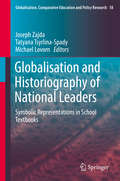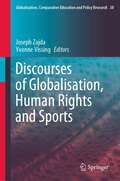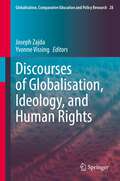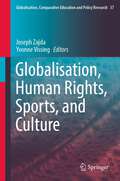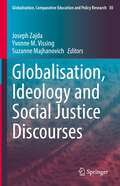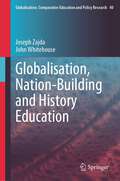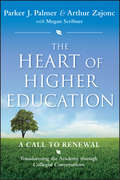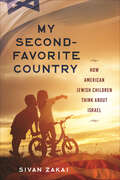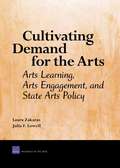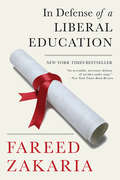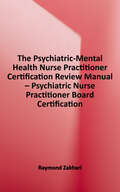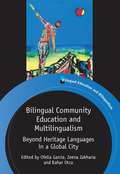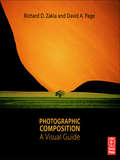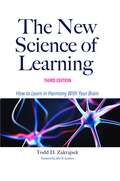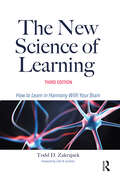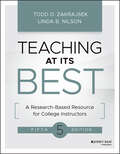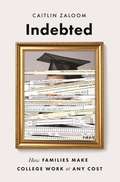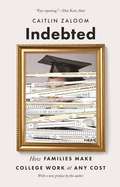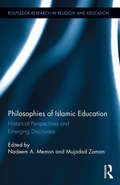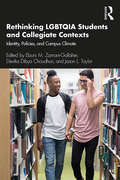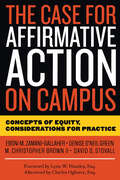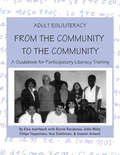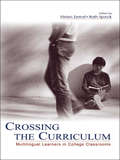- Table View
- List View
Globalisation and Historiography of National Leaders
by Joseph Zajda Tatyana Tsyrlina-Spady Michael LovornGlobalisation and Historiography of National Leaders: Symbolic Representations in School Textbooks, the 18th book in the 24-volume book series Globalisation, Comparative Education and Policy Research, explores the interrelationship between ideology, national identity, national history and historical heroes, setting it in a global context. Based on this focus, the chapters represent hand-picked scholarly research on major discourses in the field of history textbooks and symbolic representations of national heroes, and draw upon recent studies in the areas of globalisation, history textbooks, and national leaders. A number of researchers have written on the importance of teaching national history in order to foster national identity and a sense of belonging to a certain society, state, and people among the younger generation. Some nations prefer to create national heroes out of their political leaders who are still in power, and whose lives and reputation are portrayed as being eminently spotless. Using diverse comparative education paradigms from critical theory, social semiotics, and historical-comparative research, the authors analyse the unpacking of the ideological agenda hidden behind the choice and lionization (or silencing) of the preferred national heroes. They provide an informed critique of various historical narratives depicting national leaders and national heroes. The book provides an easily accessible, practical yet scholarly source of information on international concerns in the field of globalisation, history education and policy research. Offering an essential sourcebook of ideas for researchers, history educators, practitioners and policymakers in the fields of globalisation and history education, it also provides a timely overview of current changes in politically correct history education narratives in history textbooks.
Discourses of Globalisation, Human Rights and Sports (Globalisation, Comparative Education and Policy Research #38)
by Joseph Zajda Yvonne VissingThis book discusses major discourses of performing sports within human rights. Research findings data demonstrate that sports is an inequitable field today that has the potential to be a social change agent. There is more discussion about rights violations and what the fields of sports can do to be more rights-respecting, but the discussions are at a surface, rather than analytic level for most sports organizations. In sports, culture and human rights, as an emerging field, it is important to develop well crafter theoretical, methodological, and pedagogical body of knowledge. There is an academic discipline of sport that showcases its interdisciplinary nature. Linking sport to the field of human rights will require theoretical, methodological, and pedagogical evolution in this new discipline. There are both organizational, environmental and individual factors associated within the nexus of sports, athletes and human rights.This book links together sports and human rights in a systematic and analytical way. It contains chapters that discuss human rights policies in performing sports, from both organizational and interpersonal perspectives. The book focuses on the benefits of sports and the human rights and safety challenges within the operations of sports organizations and their impact on individual players.
Discourses of Globalisation, Ideology, and Human Rights (Globalisation, Comparative Education and Policy Research #28)
by Joseph Zajda Yvonne VissingThis book examines dominant discourses in human rights education globally. Using diverse paradigms, ranging from critical theory to discourse analysis, the book examines major human rights education reforms and policy issues in a global culture, with a focus on the ambivalent and problematic relationship between human rights education discourses, ideology and the state. The book discusses democracy, ideology and human rights, which are among the most critical and significant factors defining and contextualising the processes surrounding human rights education globally. The book critiques current human rights education practices and policy reforms, illustrating the shifts in the relationship between the state, ideology, and human rights education policy. Written by authors from diverse backgrounds and regions, the book examines current developments in research concerning human rights education. The book enables readers to gain a more holistic understanding of the nexus between human rights education, and dominant ideologies, both locally and globally. It also provides an easily accessible, practical yet scholarly insights into international concerns in the field of human rights education in the context of global culture.
Globalisation, Human Rights, Sports, and Culture (Globalisation, Comparative Education and Policy Research #37)
by Joseph Zajda Yvonne VissingThis book offers research findings of the different types of human rights issues that concern athletes and sports programs and the issue of how organizations are addressing safety and human rights issues. The study of sports has not typically been considered as a human rights field. In recent years it is clear that athletes have experienced a variety of human rights violations. As a result, many sports programs have been confronted with criminal violations of abuse and maltreatment. Some sports organizations are developing athlete bills of rights in response. The book provides readers with an overview of the importance of human rights policies and practices in sports, and a synthesis of where the field of sport human rights could be developed. The chapters explores human rights in sports from both organizational and interpersonal approaches. There are both organizational and individual factors associated with human rights. There can be rights violations by coaches, trainers, doctors, or even other athletes. Violations can be physical, sexual, emotional, social, or financial. Organizational policies vary from being very equitable and rights-respecting to those that put athletes at risk or discriminate against them. This book is the first of its kind that links together sports and human rights in a systematic way.
Globalisation, Ideology and Social Justice Discourses (Globalisation, Comparative Education and Policy Research #30)
by Joseph Zajda Yvonne M. Vissing Suzanne MajhanovichThis book examines dominant discourses in social justice education globally. It presents cutting-edge research on the major global trends in education, social justice and policy research. Using diverse paradigms, ranging from critical theory to discourse analysis, the book examines major social justice and equity education reforms and policy issues in a global culture, with a focus on the ambivalent and problematic relationship between social justice education discourses, ideology and the state. The book discusses democracy, ideology and social justice, which are among the most critical and significant factors defining and contextualising the processes surrounding social justice education reforms globally. It critiques current social justice education practices and policy reforms, illustrating the shifts in the relationship between the state, ideology, and social justice education policy.Written by authors from diverse backgrounds and regions, this book examines current developments in research concerning social justice education. It enables readers to gain a more holistic understanding of the nexus between social justice education, and dominant ideologies, both locally and globally. It also provides an easily accessible, practical, yet scholarly insights into local and global trends in the field of social justice education. Discourses of Globalization, Ideology and Social Justice, with contributions from key scholars worldwide, should be required reading for a broad spectrum of users, including policy-makers, academics, graduate students, education policy researchers, administrators, and practitioners.
Globalisation, Nation-Building and History Education (Globalisation, Comparative Education and Policy Research #40)
by Joseph Zajda John WhitehouseThis book uses historiography and discourse analysis to provide a new insight into understanding the nexus between ideologies, the state, and nation-building—as depicted in history school textbooks. It focuses on the interpretation of social and political change, significant events, and examining possible new biases and omissions in school textbooks. The ‘Europeanization’ of history textbooks in the EU is an example of western-dominated Grand Narrative of pluralist democracy, multiculturalism, and human rights, according to the canon of a particularly European dimension. Various public debates in the USA, China, the Russian Federation (RF), Japan, and elsewhere, dealing with understandings of a nation-building, national identity, and history education point out to parallels between the political significance of school history and the history education debates globally.The book demonstrates that the issue of national identity and balanced representations of the past continue to dominate the debate surrounding the goals, dominant ideologies and content of history textbooks, and historical narratives. It concludes that competing discourses and ideologies will continue to define and shape the nature and significance of historical knowledge, ideologies and the direction of values education in history textbooks. This book provides an easily accessible, practical, yet scholarly insights into local and global trends in the field of history education, and should be required reading for a broad spectrum of users, including policy-makers, academics, graduate students, education policy researchers, administrators, and practitioners.
The Heart of Higher Education
by Arthur Zajonc Mark Nepo Palmer Parker J. Megan ScribnerA call to advance integrative teaching and learning in higher education. From Parker Palmer, best-selling author of The Courage to Teach, and Arthur Zajonc, professor of physics at Amherst College and director of the academic program of the Center for Contemplative Mind in Society, comes this call to revisit the roots and reclaim the vision of higher education. The Heart of Higher Education proposes an approach to teaching and learning that honors the whole human being-mind, heart, and spirit-an essential integration if we hope to address the complex issues of our time. The book offers a rich interplay of analysis, theory, and proposals for action from two educators and writers who have contributed to developing the field of integrative education over the past few decades. Presents Parker Palmer's powerful response to critics of holistic learning and Arthur Zajonc's elucidation of the relationship between science, the humanities, and the contemplative traditions Explores ways to take steps toward making colleges and universities places that awaken the deepest potential in students, faculty, and staff Offers a practical approach to fostering renewal in higher education through collegiality and conversation The Heart of Higher Education is for all who are new to the field of holistic education, all who want to deepen their understanding of its challenges, and all who want to practice and promote this vital approach to teaching and learning on their campuses.
My Second-Favorite Country: How American Jewish Children Think About Israel
by Sivan ZakaiReveals how young American Jewish children come to develop their views about IsraelIsrael has long occupied a prominent place in the lives and imaginations of American Jews, serving as both a symbolic touchstone and a source of intercommunal conflict. In My Second-Favorite Country, Sivan Zakai offers the first longitudinal study of how American Jewish children come to think and feel about Israel, tracking their evolving conceptions from kindergarten to fifth grade. This work sheds light on the perception of Israel in the minds of Jewish children in the US and provides a rich case study of how children more generally develop ideas and beliefs about self, community, nation, and world. In contrast to popular views of America’s youth as naive or uninterested, this book illuminates both the complexity of their thinking and their desire to be included in conversations about important civic and political matters. Zakai draws from compelling empirical data to prove that children spend considerable effort contemplating the very concepts that adults often assume they are not ready to discuss. Indeed, the book argues that over the course of their elementary school education, children develop and express deep interest in complex issues such as the intricacies of identity and belonging, conflicting ways of framing the past, and the demands of civic responsibility. Ultimately, Zakai argues that in order to take children’s ideas seriously and better prepare them for a world full of disagreement, a substantive shift in educational practices is necessary.
Cultivating Demand for the Arts
by Laura Zakaras Julia F. LowellWhat does it mean to cultivate demand for the arts? Why is it important and necessary to do so? What can state arts agencies and other arts and education policymakers do to make it happen? The authors set out a framework for thinking about supply and demand in the arts and identify the roles that different factors, particularly arts learning, play in increasing demand for the arts.
In Defense of a Liberal Education
by Fareed ZakariaCNN host and best-selling author Fareed Zakaria argues for a renewed commitment to the world's most valuable educational tradition. The liberal arts are under attack. The governors of Florida, Texas, and North Carolina have all pledged that they will not spend taxpayer money subsidizing the liberal arts, and they seem to have an unlikely ally in President Obama. While at a General Electric plant in early 2014, Obama remarked, "I promise you, folks can make a lot more, potentially, with skilled manufacturing or the trades than they might with an art history degree." These messages are hitting home: majors like English and history, once very popular and highly respected, are in steep decline. "I get it," writes Fareed Zakaria, recalling the atmosphere in India where he grew up, which was even more obsessed with getting a skills-based education. However, the CNN host and best-selling author explains why this widely held view is mistaken and shortsighted. Zakaria eloquently expounds on the virtues of a liberal arts education--how to write clearly, how to express yourself convincingly, and how to think analytically. He turns our leaders' vocational argument on its head. American routine manufacturing jobs continue to get automated or outsourced, and specific vocational knowledge is often outdated within a few years. Engineering is a great profession, but key value-added skills you will also need are creativity, lateral thinking, design, communication, storytelling, and, more than anything, the ability to continually learn and enjoy learning--precisely the gifts of a liberal education. Zakaria argues that technology is transforming education, opening up access to the best courses and classes in a vast variety of subjects for millions around the world. We are at the dawn of the greatest expansion of the idea of a liberal education in human history.
In Defense of a Liberal Education
by Fareed ZakariaCNN host and best-selling author Fareed Zakaria argues for a renewed commitment to the world's most valuable educational tradition. The liberal arts are under attack. The governors of Florida, Texas, and North Carolina have all pledged that they will not spend taxpayer money subsidizing the liberal arts, and they seem to have an unlikely ally in President Obama. While at a General Electric plant in early 2014, Obama remarked, "I promise you, folks can make a lot more, potentially, with skilled manufacturing or the trades than they might with an art history degree." These messages are hitting home: majors like English and history, once very popular and highly respected, are in steep decline. "I get it," writes Fareed Zakaria, recalling the atmosphere in India where he grew up, which was even more obsessed with getting a skills-based education. However, the CNN host and best-selling author explains why this widely held view is mistaken and shortsighted. Zakaria eloquently expounds on the virtues of a liberal arts education--how to write clearly, how to express yourself convincingly, and how to think analytically. He turns our leaders' vocational argument on its head. American routine manufacturing jobs continue to get automated or outsourced, and specific vocational knowledge is often outdated within a few years. Engineering is a great profession, but key value-added skills you will also need are creativity, lateral thinking, design, communication, storytelling, and, more than anything, the ability to continually learn and enjoy learning--precisely the gifts of a liberal education. Zakaria argues that technology is transforming education, opening up access to the best courses and classes in a vast variety of subjects for millions around the world. We are at the dawn of the greatest expansion of the idea of a liberal education in human history.
In Defense of a Liberal Education
by Fareed ZakariaCNN host and best-selling author Fareed Zakaria argues for a renewed commitment to the world's most valuable educational tradition.<P><P> The liberal arts are under attack. The governors of Florida, Texas, and North Carolina have all pledged that they will not spend taxpayer money subsidizing the liberal arts, and they seem to have an unlikely ally in President Obama. While at a General Electric plant in early 2014, Obama remarked, "I promise you, folks can make a lot more, potentially, with skilled manufacturing or the trades than they might with an art history degree." These messages are hitting home: majors like English and history, once very popular and highly respected, are in steep decline.<P> "I get it," writes Fareed Zakaria, recalling the atmosphere in India where he grew up, which was even more obsessed with getting a skills-based education. However, the CNN host and best-selling author explains why this widely held view is mistaken and shortsighted.<P> Zakaria eloquently expounds on the virtues of a liberal arts education--how to write clearly, how to express yourself convincingly, and how to think analytically. He turns our leaders' vocational argument on its head. American routine manufacturing jobs continue to get automated or outsourced, and specific vocational knowledge is often outdated within a few years. Engineering is a great profession, but key value-added skills you will also need are creativity, lateral thinking, design, communication, storytelling, and, more than anything, the ability to continually learn and enjoy learning--precisely the gifts of a liberal education.<P> Zakaria argues that technology is transforming education, opening up access to the best courses and classes in a vast variety of subjects for millions around the world. We are at the dawn of the greatest expansion of the idea of a liberal education in human history.
The Psychiatric-Mental Health Nurse Practitioner Certification Review Manual
by Raymond ZakhariThis review manual prepares students to successfully pass the ANCC Psychiatric-Mental Health Nurse Practitioner board certification examination. It encompasses all of the essential knowledge required, uses a succinct outline format that highlights critical detail, and systematically follows the test blueprint so that those taking the exam will be optimally prepared. The review manual begins with an overview of the certification examination, self-care, and test tips; the role of the psychiatric-mental health nurse practitioner, the scope of practice, and regulations; and the theoretical foundations of care. Other topics examined include the neuroanatomy and physiology of mental illness; psychopharmacology; physical assessment, diagnostic tests, and differential diagnosis. A wide range of psychiatric disorders, as organized in the DSM-5, are also reviewed. Each of the chapters includes learning objectives, easy-to-read outline format, and end-of-chapter review questions. The review manual concludes with a 150-question practice test. Key Features: - Reflects the latest ANCC test blueprint - Includes test-taking strategies and tips for preparing for the big day; scope of practice; and theoretical foundations of care - Covers a wide range of psychiatric disorders, as organized in the DSM-5 - Includes end-of-chapter review questions and rationales, PLUS a valuable 150-question practice test with rationales―more than 400 questions in total - Purchase includes access to the eBook for use on most mobile devices or computers
Bilingual Community Education and Multilingualism
by Zeena Zakharia Ofelia GarcíaThis book explores bilingual community education, specifically the educational spaces shaped and organized by American ethnolinguistic communities for their children in the multilingual city of New York. Employing a rich variety of case studies which highlight the importance of the ethnolinguistic community in bilingual education, this collection examines the various structures that these communities use to educate their children as bilingual Americans. In doing so, it highlights the efforts and activism of these communities and what bilingual community education really means in today's globalized world. The volume offers new understandings of heritage language education, bilingual education, and speech communities for bilingual Americans in the 21st century.
Photographic Composition: A Visual Guide
by Richard D. Zakia David Page"Those of you who follow this blog know that Dr. Richard Zakia, former RIT professor, is one of my all time favorite photo gurus. We send each other pictures. We talk about looking into pictures - and not just looking at them. Big difference.. Dr. Richard Zakia, a.k.a. Dick, is the co-author, along with David Page, of Photographic Composition: A Visual Guide. These two dudes are also two of my favorite people."---Rick Sammon's blog "Covers all the tips needed to help photographers construct their own unique, outstanding images and is an outstanding 'must' for any collection."--CA Bookwatch
The New Science Of Learning: How To Learn In Harmony With Your Brain
by Todd D. ZakrajsekWhile preserving the elements that have made the previous two editions so successful―such as chapters on sleep, exercise, memory and mindset―this third edition introduces students to wholly new aspects of brain function and how they impact learning; and furthermore, addresses the challenges of learning online. By introducing new concepts, strategies, and applications related to learning and memory that are based on current findings in cognitive, social, and motivational psychology, this text offers a richer and more complete picture of how brain science illuminates how we learn. Students assigned this book will be equipped to design effective learning plans, employ new strategies, recognize learning traps, discover ways to work effectively in groups, improve recall, and realize better academic performance through test-taking and paper-writing strategies. This new edition also addresses the concerns of all students―particularly those unfamiliar with the college setting and its expectations and assumptions―and offers strategies for success. In keeping with the preceding editions, this book introduces students to concepts, techniques, strategies, tips, and ideas to help them be academically stronger students, advance faster in their studies, and demonstrate what they have learned more effectively―in short, how anyone can learn to be a better learner by learning how to learn in harmony with their brain. The book remains compact and student-friendly, offers examples of practice, and includes discussion questions at the end of each chapter. An instructor's manual is available for faculty.
The New Science of Learning: How to Learn in Harmony With Your Brain
by Todd D. ZakrajsekWhile preserving the elements that have made the previous two editions so successful—such as chapters on sleep, exercise, memory and mindset—this third edition introduces students to wholly new aspects of brain function and how they impact learning; and furthermore, addresses the challenges of learning online. By introducing new concepts, strategies, and applications related to learning and memory that are based on current findings in cognitive, social, and motivational psychology, this text offers a richer and more complete picture of how brain science illuminates how we learn. Students assigned this book will be equipped to design effective learning plans, employ new strategies, recognize learning traps, discover ways to work effectively in groups, improve recall, and realize better academic performance through test-taking and paper-writing strategies. This new edition also addresses the concerns of all students—particularly those unfamiliar with the college setting and its expectations and assumptions—and offers strategies for success. In keeping with the preceding editions, this book introduces students to concepts, techniques, strategies, tips, and ideas to help them be academically stronger students, advance faster in their studies, and demonstrate what they have learned more effectively—in short, how anyone can learn to be a better learner by learning how to learn in harmony with their brain. The book remains compact and student-friendly, offers examples of practice, and includes discussion questions at the end of each chapter.
Teaching at Its Best: A Research-Based Resource for College Instructors
by Todd D. Zakrajsek Linda B. NilsonA complete, accessible, evidence-based guide to better teaching in higher education This higher education playbook provides a wealth of research-backed practices for nearly every aspect of effective teaching throughout higher education. It is filled with practical guidance and proven techniques designed to help you improve student learning, both face-to-face and online. Already a bestselling research-based toolbox written for college instructors of any experience level, Teaching at Its Best just got even better. What is new? A lot. For this updated 5th edition, Todd Zakrajsek joins Linda Nilson to create a powerful collaboration, drawing on nearly 90 combined years as internationally recognized faculty developers and faculty members. One of the most comprehensive books on effective teaching and learning, the 5th edition of Teaching at its Best brings new concepts, new research, and additional perspectives to teaching in higher education. In this book, you will find helpful advice on active learning, interactive lecturing, self-regulated learning, the science of learning, giving and receiving feedback, and so much more. Each chapter has been revised where necessary to reflect current higher education pedagogy and now includes two reflection questions and one application prompt to reflect on your teaching and stimulate peer discussions. Discover the value of course design and how to write effective learning outcomes Learn which educational technology is worthwhile and which is a waste of time Create a welcoming classroom environment that boosts motivation Explore detailed explanations of techniques, formats, activities, and exercises—both in person and online Enjoy reading about teaching strategies and educational concepts Whether used as a resource for new and seasoned faculty, a guide for teaching assistants, or a tool to facilitate faculty development, this research-based book is highly regarded across all institutional types.
Indebted: How Families Make College Work at Any Cost
by Caitlin ZaloomHow the financial pressures of paying for college affect the lives and well-being of middle-class familiesThe struggle to pay for college is one of the defining features of middle-class life in America today. At kitchen tables all across the country, parents agonize over whether to burden their children with loans or to sacrifice their own financial security by taking out a second mortgage or draining their retirement savings. Indebted takes readers into the homes of middle-class families throughout the nation to reveal the hidden consequences of student debt and the ways that financing college has transformed family life.Caitlin Zaloom gained the confidence of numerous parents and their college-age children, who talked candidly with her about stressful and intensely personal financial matters that are usually kept private. In this remarkable book, Zaloom describes the profound moral conflicts for parents as they try to honor what they see as their highest parental duty—providing their children with opportunity—and shows how parents and students alike are forced to take on enormous debts and gamble on an investment that might not pay off. What emerges is a troubling portrait of an American middle class fettered by the "student finance complex"—the bewildering labyrinth of government-sponsored institutions, profit-seeking firms, and university offices that collect information on household earnings and assets, assess family needs, and decide who is eligible for aid and who is not.Superbly written and unflinchingly honest, Indebted breaks through the culture of silence surrounding the student debt crisis, revealing the unspoken costs of sending our kids to college.
Indebted: How Families Make College Work at Any Cost
by Caitlin ZaloomHow the financial pressures of paying for college affect the lives and well-being of middle-class familiesThe struggle to pay for college is a defining feature of middle-class life in America. Caitlin Zaloom takes readers into homes of families throughout the nation to reveal the hidden consequences of student debt and the ways that financing college has transformed our most sacred relationships. She describes the profound moral conflicts for parents as they try to honor what they see as their highest parental duty—providing their children with opportunity—and shows how parents and students alike are forced to gamble on an investment that might not pay off. Superbly written and unflinchingly honest, Indebted breaks through the culture of silence surrounding the student debt crisis, exposing the unspoken costs of sending our kids to college.
Philosophies of Islamic Education: Historical Perspectives and Emerging Discourses (Routledge Research in Religion and Education #4)
by Mujadad Zaman Nadeem A. MemonThe study of Islamic education has hitherto remained a tangential inquiry in the broader focus of Islamic Studies. In the wake of this neglect, a renaissance of sorts has occurred in recent years, reconfiguring the importance of Islam’s attitudes to knowledge, learning and education as paramount in the study and appreciation of Islamic civilization. Philosophies of Islamic Education, stands in tandem to this call and takes a pioneering step in establishing the importance of its study for the educationalist, academic and student alike. Broken into four sections, it deals with theological, pedagogic, institutional and contemporary issues reflecting the diverse and often competing notions and practices of Islamic education. As a unique international collaboration bringing into conversation theologians, historians, philosophers, teachers and sociologists of education Philosophies of Islamic Education intends to provide fresh means for conversing with contemporary debates in ethics, secularization theory, child psychology, multiculturalism, interfaith dialogue and moral education. In doing so, it hopes to offer an important and timely contribution to educational studies as well as give new insight for academia in terms of conceiving learning and education.
Rethinking LGBTQIA Students and Collegiate Contexts: Identity, Policies, and Campus Climate
by Eboni M. Zamani-Gallaher Devika Dibya Choudhuri Jason L. TaylorRethinking LGBTQIA Students and Collegiate Contexts situates and problematizes identity interaction, campus life, student experiences, and the effectiveness of services, programs, and policies affecting LGBTQIA college students at both two- and four-year institutions. This volume draws from intersectional and critical perspectives to explore the complex ways in which LGBTQIA identities are shaped, discussed, and researched in higher education spaces. Chapters provide student affairs and higher education scholars with theory and practice perspectives on sociopolitical and historical contexts, student learning and development, support services, and explore how higher education reflects society’s pervasive stereotypes and lack of awareness of LGBTQIA students’ identity development and needs.
The Case for Affirmative Action on Campus: Concepts of Equity, Considerations for Practice
by Eboni M. Zamani-Gallaher Denise O’Neil Green David O. Stovall M. Christopher Brown II* Marshalls the arguments for affirmative action* Offers strategies for actionWhy is affirmative action under attack? What were the policy’s original purposes, and have they been achieved? What are the arguments being arrayed against it? And–for all stakeholders concerned about equity and diversity on campus–what’s the way forward, politically, legally, and practically?The authors explore the historical context, the philosophical and legal foundations of affirmative action, present contemporary attitudes to the issue on and off campus, and uncover the tactics and arguments of its opponents. They conclude by offering strategies to counter the erosion of affirmative action, change the basis of the discourse, and coordinate institutional support to foster inclusive college environments and multi-ethnic campus communities.This book analyzes the ideological and legal construction of colorblind legislation that has led to the de facto exclusion of people of color from institutions of higher education. It addresses the role of the courts in affecting affirmative action in higher education as a workplace and place of study. It documents the under-representation of collegians of color and presents research on student opinion on race-based policies at two- and four-year institutions. It details the pervasiveness of the affirmative action debate across educational sectors and the status of race among myriad factors considered in college admissions. Finally, it considers affirmative action as a pipeline issue and in the light of educational policy.
Adult ESL/Literacy From the Community to the Community: A Guidebook for Participatory Literacy Training
by Ana Zambrano Elsa Auerbach Byron Barahona Julio Midy Felipe VaqueranoAdult ESL/Literacy from the Community to the Community: A Guidebook for Participatory Literacy Training tells the story of a university-community collaboration to develop, implement, and evaluate a project designed to train immigrants and refugees as adult ESL and native literacy instructors in their own communities. Beyond the story of this one project, the book is also a clear and powerful explication of the underlying principles and premises of the program model it describes: community leadership development, a participatory approach to literacy instruction and instructor training, native language adult literacy instruction, and collaboration.
Crossing the Curriculum: Multilingual Learners in College Classrooms
by Vivian Zamel Ruth SpackAs college classrooms have become more linguistically diverse, the work of ESOL professionals has expanded to include research on the experiences of multilingual learners not only in ESOL courses but also in courses across the curriculum. At the same time that ESOL professionals are trying to understand the academic challenges that learners face beyond ESOL courses, faculty across the disciplines are trying to meet the challenge of teaching students of differing linguistic backgrounds. Crossing the Curriculum: Multilingual Learners in College Classrooms responds to these issues and concerns by capturing the complex and content-specific nature of students' and teachers' experiences and providing a nuanced understanding of how multilingual students' learning can be fostered and sustained. Crossing the Curriculum: Multilingual Learners in College Classrooms is unique in bringing together the perspectives of researchers, students, and teachers. These multiple lenses allow for a richly layered picture of how students and teachers actually experience college classrooms. Common themes and pedagogical principles resonate across the three distinct sections of the book:*Part One, "Investigating Students' Experiences Across the Curriculum: Through the Eyes of Classroom Researchers," consists of chapters written by ESOL and composition researchers who have investigated multilingual students' experiences in undergraduate courses across the curriculum.*Part Two, "Learning Across the Curriculum: Through Students' Eyes," consists of chapters written by two multilingual learners who chronicled their experiences as they crossed the curriculum over time.*Part Three, "Engaging Students in Learning: Through the Eyes of Faculty Across the Curriculum," consists of chapters written by faculty from several academic fields--Anthropology, Philosophy, Nursing, Literature, Sociology, and Asian American Studies--who discuss their own attempts to address the needs of multilingual learners in their classrooms.
